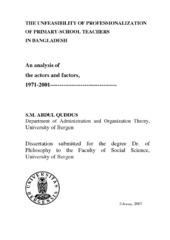The Unfeasibility of Professionalization of Primary-school Teachers in Bangladesh. An analysis of the actors and factors, 1971 - 2001
Doctoral thesis
Permanent lenke
https://hdl.handle.net/1956/2318Utgivelsesdato
2007-06-22Metadata
Vis full innførselSamlinger
- Department of Government [457]
Sammendrag
Objectives of the Study:The main purposes of this study are to obtain a clearer understanding of the characteristics ofprimary teaching occupation in Bangladesh and to examine the development of thisoccupational group over the period 1971-2001 (for example, to consider teachers’ perceptionsof their vocational position, both today and in 1971; the extent to which they emerge as adistinct, publicly recognised occupation that controls their own work; and the extent to whichit is possible to observe the factors and actors that inhibit the professionalization of primaryteachers in Bangladesh). Despite the fact that there are eleven types of primary educationinstitutions in the country, the state has the overall responsibility for all GPSs (NationalEducation Commission, 2003). In 2005 there were a total of 37,671 GPS with a teaching staffof about 162 thousand (Daily Ajkerkagoj, Dhaka, dated 18.03.2005). In the same year a totalof about 18.3 million students were enrolled in these schools, while all other types of primaryschools had a total enrolment of about 6.8 million students (ibid). However, this study onlyconsiders teachers working in the public sector, i.e. in GPS.On the basis of the above discussion of the research problem, the overall general objective ofthis study is: to examine the actors and factors that promote or inhibit professionalization ofgovernment primary-school teachers in Bangladesh.
Utgiver
The University of BergenOpphavsrett
S.M. Abdul QuddusThe publication is protected by Norwegian copyright law, with all rights reserved.
